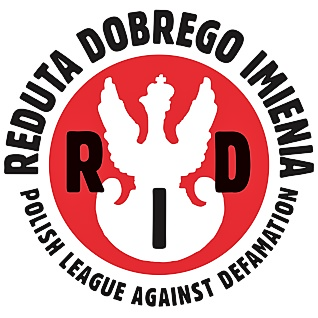The trial against Barbara Engelking and Jan Grabowski, co-authors of the controversial book “Dalej Jest Noc”’, began in the District Court in Warsaw. Everything indicates that the defendants, who accuse Edward Malinowski of being an informer, whose information led to the extermination of Jews living in his village during World War II, committed research and methodological errors – including that of confusing two different people, with the same name and surname whose biographies they merged into one. The lawsuit against the authors of the publication – in defense of her uncles good name was brought by Edward Malinowski’s niece, Filomena Leszczyńska. She is being supported by “Reduta Dobrego Imienia”. In fact, Edward Malinowski was a Polish hero who, risking his life, helped Jews and hid them from the Germans.
However, at today’s hearing, the parties were not heard because of the absence of Prof. Jan Grabowski, who, according to his proxies, was not properly notified.
In our opinion, in such a, case it was necessary to carry out a very solid verification of historical sources. Unfortunately, in my opinion, the authors of „Dalej jest Noc” did not do this, slandering an innocent man. Grabowski and Engelking’s book presented a false version of events, and such a presentation – in my opinion – harm the personal rights of not only the niece, but every Pole – emphasizes Maciej Świrski, President of”Reduta Dobrego Imienia”, who supports Filomena Leszczynska in her fight for the good name of her uncle . He adds that at today’s hearing, the defendant’s attorney downplayed the-what he called- the „mistake” i.e.the fact that the authors’ merged the biographies of two Edward Malinowski into one. This is not the only “mistake “ made by the authors of the controversial book. Information about the alleged involvement of Edward Malinowski in the murder of Jews, was presented on the basis of a testimony by Maria Wiltgren (who was saved by Edward Malinowski), submitted in 1996 to Yad Vashem. However, it is worth adding, that a completely different testimony was given by Maria Wiltgren (then as Estera Drogicka) in 1950, defending Edward Malinowski at his trial. And another version was presented by Maria Wiltgren (then Estera Drogicka) shortly after the war, when she was applying for a job in the “Urząd Bezpieczeństwa -UB”(the communist secret police who did in fact sign an employment contract with her). Her records as an employee of the “UB” survived. The researchers – according to the plaintiff – did not verify the basic documents, which are the biographies of Maria Wiltgren (appearing in documents under four different names) completely ignored the one that the woman submitted shortly after the war, when applying for a job in UB. They`omitted testimonies’of other survivors contained in the court records of the trial which was held in 1950, whom Edward Malinowski helped at the risk of his own life. The authors’ behavior is in my assessment – contrary to the ideals of reliable research work. We came across this situation, but we are afraid that there are many more errors of this type, as other historians have already pointed out – adds Maciej Świrski.
Edward Malinowski, uncle of Filomena Leszczyńska, was presented in excerpts from the publication „Dalej Jest Noc” as „an accomplice to the death of several dozen Jews, who were hiding in the woods and whose whereabouts was disclosed to the Germans”. In fact, he helped Jews. Jan Grabowski and Barbara Engelking,-it seems- that while accusing Malinowski, did not appear to carry out a a thorough analysis of documents – which is obvious for every historian. If they had , the biographies of Edward Malinowski, son of Stanisław, Mayor of Malinów and the life of another Edward Malinowski, son of Adolf, former Mayor of this village, would not have been combined. Both men had the same names, and during the occupation they both had contact with Maria Wiltgren. And it was her testimony, as the defendants say, that gave rise to the accusations brought against Edward Malinowski – uncle of Filomena Leszczyńska.
These allegations were refuted during a trial in 1950, in which survivors themselves testified on behalf of the accused. As for the account made by Maria Wiltgren herself, it should be emphasized that she was only a so-called hearing witness. At the time of the denunciation of Jews hiding in the forest near Malinów, she was acutely not in the village. She only came there a year later. What’s more, she only gave her testimony, (the one Barbara Engelking and Jan Grabowski used) in 1996, that is over 50 years after the events in Malinów, reporting only what she heard a year after the actual events took place. According to lawyers representing Filomena Leszczyńska, the defendants did not properly analyze Maria Wiltgren’s documents and testimonies, and they did not sufficiently substantiate their thesis that the accusations made by this woman, concern the Edward Malinowski described in the book.
Filomena Leszczyńska, with the support of “Reduta Dobrego Imienia”, demands the removal of the effects of a violation of personal interests by- making public statements and reprints of the book , in accordance with the truthful testimonies of Maria Wiltgren (then as Wiśniewska) and compensation in the amount of PLN 100,000. “Reduta Dobrego Imienia”is covering the costs of this case (the attorney and court costs as well as administrative costs. Also the costs of experts and historians).

